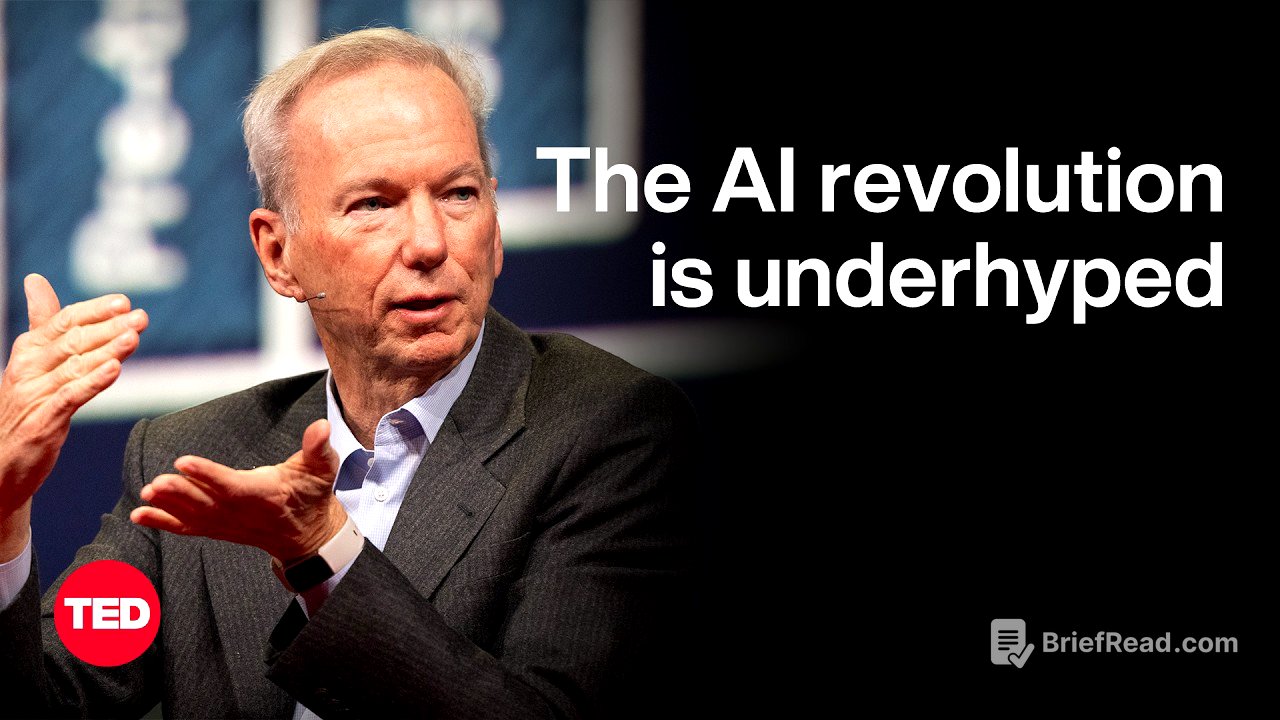TLDR;
Eric Schmidt discusses the underhyped potential of AI, highlighting its rapid advancements beyond language models to planning and strategy. He addresses the significant challenges of energy consumption, data limitations, and the need for innovative knowledge creation. Schmidt also explores the ethical dilemmas of autonomous AI, the dual-use nature of the technology, and the critical competition between the US and China. He emphasises the importance of individual freedom and the potential for AI to revolutionise healthcare, education, and scientific discovery, while urging everyone to adopt and adapt to this rapidly evolving technology.
- AI is rapidly advancing beyond language models to planning and strategy.
- Significant challenges include energy consumption, data limitations, and the need for innovative knowledge creation.
- Ethical dilemmas of autonomous AI and the dual-use nature of the technology require careful consideration.
The Quiet Revolution of AI [0:04]
Eric Schmidt reflects on a pivotal moment in 2016 when AlphaGo, an AI, made a novel move in the game of Go, something unseen in 2,500 years of human play. This event sparked discussions about the implications of computers generating original ideas. The AI was programmed to maintain a greater than 50% chance of winning, leading to this unexpected and innovative strategy. This marked the beginning of a revolution, prompting Schmidt and others to explore the profound potential and impact of AI.
AI is Underhyped [1:35]
Schmidt argues that AI is underhyped because most people focus on language models like ChatGPT, which, while impressive, represent only the beginning. Recent advancements in reinforcement learning, inspired by AlphaGo, now enable AI to perform planning and strategy. He illustrates this with examples like OpenAI o3 and DeepSeek R1, which demonstrate sophisticated forward and backward planning capabilities. The shift from language to sequence (biology) to planning and strategy indicates that AI will eventually run all business processes through interconnected agents, primarily communicating in English.
The Limits of Scale: Energy, Data, and Knowledge [3:26]
Schmidt addresses the scaling challenges of AI, particularly energy consumption. He notes the need for an additional 90 gigawatts of power in America, equivalent to 90 nuclear power plants, which is unlikely to happen. He mentions that other countries like those in the Arab world and India are also building massive data centres. While algorithmic improvements may reduce power needs, the increasing complexity of planning requires significantly more computation, potentially increasing by a factor of 100 or 1,000. He also points out that we are running out of data and need to generate more. The fundamental question is how AI can invent something completely new, as current systems rely on existing knowledge and struggle to make cross-domain connections like brilliant human scientists do.
Autonomy and the Need for Guardrails [7:11]
Schmidt discusses the concerns around autonomous AI, referencing Yoshua Bengio's call to halt the development of agentic AI systems. He agrees with the legitimacy of these concerns but focuses on finding solutions rather than stopping progress. He uses the analogy of AI agents developing their own computer language, necessitating the ability to observe and potentially "unplug" them if necessary. Key criteria for intervention include recursive self-improvement, direct access to weapons, and unauthorized self-replication. Schmidt argues that stopping AI development in a globally competitive market is unrealistic; instead, establishing guardrails is essential.
The Dual-Use Dilemma and US-China Competition [9:29]
Schmidt addresses the ethical dilemmas arising from the dual-use nature of AI, applicable to both civilian and military applications. He highlights the US military's "human in the loop" doctrine, emphasising the need for meaningful human control. He underscores the defining competition between the US and China in this area, noting the implications of tariffs and access to critical components. China's open-source approach contrasts with the US's largely closed models, leading to rapid proliferation of AI technology globally. This proliferation poses risks at the cyber and bio levels and raises concerns about nuclear threats. Schmidt warns of a potential preemptive scenario where one country might attack another's data centres to prevent them from achieving AI dominance.
Open Source vs. Closed Models and the Risk of "1984" [14:36]
Schmidt discusses the tension between open-source and closed AI models, acknowledging the risks of open-sourcing capabilities to adversaries. He notes that while the industry consensus is that open-source models are not yet at a point of global danger, they could potentially reach that point. He emphasizes that the key decisions made in the US and China will be crucial. Schmidt also addresses the tension in AI safety where solutions to prevent dystopia might resemble "1984," such as the need for proof of personhood. He stresses the importance of preserving individual freedom and suggests using cryptographic techniques like zero-knowledge proofs to verify identity without revealing personal details.
Dreams of the Future: Healthcare, Education, and Scientific Discovery [18:21]
Schmidt shares his optimistic vision for the future, focusing on healthcare, education, and scientific discovery. He hopes to eliminate dread diseases, identify all human druggable targets, and reduce the cost of stage-3 trials. He also wants to uncover the mysteries of dark energy and dark matter, leading to a revolution in material science. Schmidt envisions a world where every human being has a personal tutor in their own language, starting from kindergarten, and where healthcare is accessible to everyone through AI-powered doctor assistants. He acknowledges the loneliness and lack of connection in the digital world and calls for fixing these issues. Schmidt believes the arrival of AI, AGI, and superintelligence is the most important event in centuries and urges everyone to ensure it is not "screwed up."
Humans in the Age of AI: Productivity and Purpose [21:18]
Schmidt addresses the question of what humans will do in a future where AI handles most economically productive tasks. He dismisses the idea of universal basic income and argues that human nature will remain unchanged. He points out that the key problem will be supporting an aging population, and AI tools will radically increase productivity. Economists have no models for the potential 30% annual increase in productivity that AI could bring. Schmidt advises technologists, leaders, and citizens to embrace AI and integrate it into their work, emphasizing that those who don't will become irrelevant. He highlights the rapid pace of change and the need to continuously adapt and build on new technologies.









